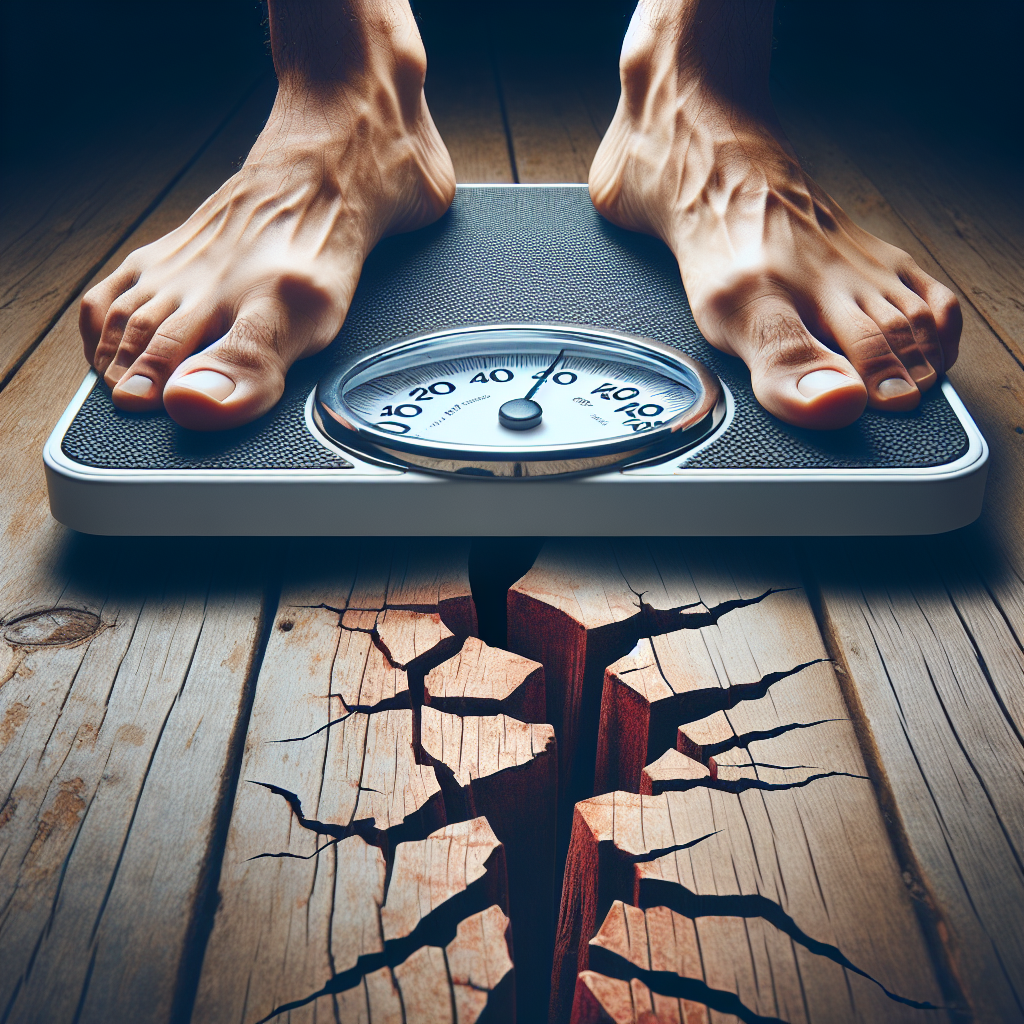

What Is The Impact Of Weight Gain On Lower Back Pain?
If you’ve ever experienced lower back pain, you know just how debilitating and frustrating it can be. But have you ever considered the impact that weight gain might have on this common ailment? Surprisingly, the connection between weight gain and lower back pain is quite significant. As you pack on the pounds, the additional weight puts extra strain on your spine and tissues. In turn, this can lead to increased pressure on the nerves in your lower back, causing discomfort and pain. In this article, we’ll explore the relationship between weight gain and lower back pain, and uncover some valuable tips for managing and alleviating this discomfort. So, grab a seat and let’s dive right in!

Causes of weight gain
Unhealthy eating habits
Unhealthy eating habits, such as consuming a diet high in processed foods, sugary drinks, and unhealthy fats, can contribute to weight gain. These foods are often calorie-dense and lacking in essential nutrients, leading to excessive calorie intake and weight gain over time.
Lack of physical activity
A sedentary lifestyle with little to no physical activity can also lead to weight gain. Regular exercise helps burn calories and maintain a healthy weight. When you do not engage in enough physical activity, you are more likely to store excess calories as fat, resulting in weight gain.
Genetics
Genetics can play a role in weight gain. Some individuals may have a genetic predisposition to gain weight more easily than others. This does not mean that genetics alone determine weight gain, but they can influence factors such as metabolism, appetite, and fat storage.
Medical conditions
Certain medical conditions, such as hypothyroidism and polycystic ovary syndrome (PCOS), can cause weight gain. These conditions affect hormone levels and metabolism, making it more difficult for the body to maintain a healthy weight.
Medications
Certain medications, including antidepressants, antipsychotics, and corticosteroids, can cause weight gain as a side effect. These medications can affect metabolism, appetite, and how the body stores fat, leading to weight gain.
Relation between weight gain and lower back pain
Increased stress on the spine
Weight gain can put additional stress on the spine, especially the lower back. As you gain weight, the spine bears the burden of supporting the increased load, leading to strain on the muscles, ligaments, and discs in the lower back.
Higher risk of disc herniation
Excess weight can increase the risk of disc herniation, where the soft cushioning discs between the vertebrae slip out of place. The additional weight puts more pressure on the discs, making them more vulnerable to herniation and resulting in lower back pain.
Impaired spinal stability
Weight gain can lead to changes in spinal stability. The extra weight can cause a misalignment of the spine and affect the balance of muscles supporting the back. This can result in pain and discomfort in the lower back.
Inflammation and joint degeneration
Excess weight can lead to chronic inflammation in the body, including the spine. Inflammation can cause joint degeneration, leading to conditions such as osteoarthritis. In the lower back, this can contribute to pain and stiffness.
Effects of excess weight on the spine and back muscles
Increased load on the intervertebral discs
Excess weight puts added pressure on the intervertebral discs in the spine. These discs act as shock absorbers between the vertebrae. The increased load can cause the discs to compress and bulge, leading to pain in the lower back.
Compression of nerves
Weight gain can compress the nerves that run through the spine. This compression can lead to a condition called sciatica, where pain radiates from the lower back down the leg. The compression of nerves can cause sharp, shooting pain and numbness in the lower back and leg.
Muscular imbalances
Excessive weight can lead to muscular imbalances in the back. The weight-bearing muscles may become weak and strained, while other muscles may tighten and become overactive. These imbalances can contribute to lower back pain and discomfort.
Reduced flexibility
Weight gain can lead to decreased flexibility in the muscles and joints of the back. Lack of flexibility can restrict movement and increase the risk of injury. Limited range of motion in the lower back can contribute to stiffness and pain.
Research studies on weight gain and lower back pain
Study 1: Correlation between body mass index and incidence of lower back pain
A study published in the Journal of Epidemiology and Community Health found a positive correlation between body mass index (BMI) and the incidence of lower back pain. The study concluded that higher BMI was associated with a greater likelihood of experiencing back pain.
Study 2: Impact of weight loss on chronic low back pain
A study published in the journal Spine examined the effects of weight loss on chronic low back pain. The study found that participants who lost weight experienced a significant reduction in pain and disability compared to those who did not lose weight. Weight loss was shown to have a positive impact on managing chronic low back pain.
Study 3: Effects of weight gain on spinal mechanics
A study published in the journal Spine investigated the effects of weight gain on spinal mechanics. The study revealed that weight gain altered spinal alignment and increased stress on the lower back. The findings emphasized the importance of maintaining a healthy weight to prevent lower back pain.

The role of abdominal fat in lower back pain
Increased mechanical stress
Abdominal fat, commonly known as visceral fat, can contribute to lower back pain. Excess fat around the abdomen places increased mechanical stress on the lower back, leading to strain and discomfort.
Visceral fat and chronic inflammation
Abdominal fat is not just a matter of aesthetics; it can have detrimental effects on health. Visceral fat is metabolically active and releases inflammatory substances, contributing to chronic inflammation in the body. Inflammation can also affect the back, leading to pain and discomfort.
Risk of developing metabolic disorders
Excessive abdominal fat is associated with an increased risk of developing metabolic disorders such as diabetes and heart disease. These conditions can further contribute to inflammation and lower back pain. The presence of metabolic disorders makes it even more important to maintain a healthy weight to prevent or manage lower back pain.
Preventing and managing lower back pain related to weight gain
Maintaining a healthy weight
One of the most effective ways to prevent and manage lower back pain related to weight gain is by maintaining a healthy weight. This can be achieved through a combination of healthy eating habits and regular physical activity. Consult with a healthcare professional to determine an appropriate weight range for your body.
Exercising to strengthen core muscles
Engaging in activities that strengthen the core muscles can provide support to the lower back. Exercises such as planks, bridges, and abdominal crunches target the muscles that help stabilize the spine. A stronger core can alleviate pressure on the lower back and reduce the risk of pain.
Adopting proper posture
Maintaining good posture is essential for a healthy spine. Poor posture can put additional strain on the back, leading to pain and discomfort. Be mindful of your posture throughout the day, whether you are sitting, standing, or lifting heavy objects. Use ergonomic furniture and equipment to support proper alignment.
Eating a balanced diet
A balanced diet rich in fruits, vegetables, whole grains, lean proteins, and healthy fats can provide the necessary nutrients for a healthy spine and back muscles. Avoid excessive consumption of processed foods, sugary drinks, and unhealthy fats that contribute to weight gain and inflammation.
Avoiding sedentary lifestyle
Avoid a sedentary lifestyle and aim for regular physical activity. Even small changes, such as taking breaks to stretch during prolonged sitting, can make a difference. Incorporate activities you enjoy, such as walking, swimming, or dancing, to make exercise a regular part of your routine.

What Is The Impact Of Weight Gain On Lower Back Pain?
Medical interventions for weight-related lower back pain
Physical therapy
Physical therapy can help with weight-related lower back pain by providing targeted exercises and treatments to improve strength, flexibility, and posture. A physical therapist can tailor a program specifically to address your needs and help alleviate pain.
Weight loss programs
In some cases, structured weight loss programs supervised by healthcare professionals may be necessary to achieve significant weight loss. These programs often include a combination of dietary guidance, exercise plans, and behavioral support to support healthy weight management.
Non-steroidal anti-inflammatory drugs (NSAIDs)
NSAIDs, such as ibuprofen, can provide temporary relief from lower back pain associated with inflammation. These medications can help reduce pain and swelling, making it easier to engage in physical activity and manage weight-related lower back pain.
Surgical options
In severe cases where conservative treatments have not been effective, surgical options may be considered. Surgical interventions, such as spinal fusion or discectomy, aim to alleviate pressure on the spine and provide relief from weight-related lower back pain. However, surgery is typically reserved for cases where all other options have been exhausted.
Impact of weight distribution on lower back pain
Apple-shaped vs. pear-shaped body
The distribution of body fat can play a role in lower back pain. Individuals with an apple-shaped body, where fat is predominantly carried around the abdomen, may be at a higher risk of experiencing lower back pain compared to those with a pear-shaped body, where fat is distributed more evenly throughout the body.
Central obesity and increased strain on the back
Central obesity, characterized by excess fat around the abdomen and waist, can increase strain on the lower back. The additional weight places more stress on the muscles and structures of the back, leading to pain and discomfort.
Differences in spinal loading
The distribution of weight can affect how the spine handles mechanical load. Excess weight carried around the abdomen can alter spinal loading patterns, potentially leading to imbalances and increased pressure on the lower back. Maintaining a healthy weight and proper weight distribution can help minimize these effects.

What Is The Impact Of Weight Gain On Lower Back Pain?
Psychological impacts of weight gain-related lower back pain
Body image issues and self-esteem
Weight gain-related lower back pain can have an impact on body image and self-esteem. Chronic pain and discomfort can make individuals feel self-conscious about their bodies and may negatively affect their self-esteem and body image. Seeking support from mental health professionals can be beneficial in managing these psychological impacts.
Depression and anxiety
Chronic pain, including lower back pain, can contribute to the development or exacerbation of depressive and anxiety symptoms. The combination of physical discomfort, limited mobility, and the impact on daily life can lead to feelings of depression and anxiety. It is important to address these psychological aspects through therapy and support.
Impact on social life
Weight gain-related lower back pain can limit mobility and participation in social activities. Individuals may avoid social gatherings or physical activities due to pain or discomfort, which can affect their social life and relationships. Support from friends, family, and healthcare professionals can help individuals overcome these challenges and maintain an active social life.
Conclusion
Weight gain can have a significant impact on lower back pain, affecting the spine, back muscles, and overall spinal mechanics. Maintaining a healthy weight through proper nutrition, regular exercise, and avoiding a sedentary lifestyle is crucial in preventing and managing weight-related lower back pain. Medical interventions, such as physical therapy and weight loss programs, can provide further assistance in alleviating pain and improving function. It is important to consider the role of abdominal fat, weight distribution, and the psychological impacts of weight gain-related lower back pain in comprehensive prevention and treatment approaches. A multidisciplinary approach, incorporating medical, lifestyle, and psychological interventions, is essential in addressing the complex nature of weight gain-related lower back pain. By understanding the relationship between weight gain and lower back pain, individuals can take proactive steps to maintain a healthy weight and reduce the risk of developing or worsening lower back pain.







